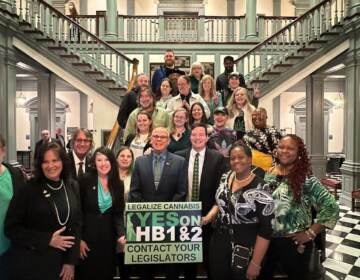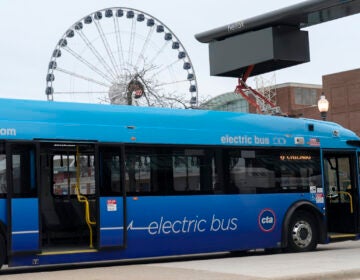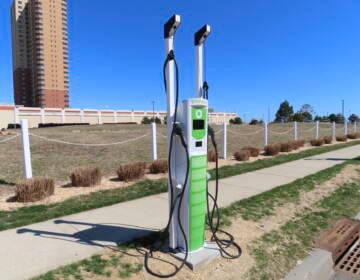‘War without guns’ or protecting ‘health and our climate’? Del. debates proposed electric vehicle mandate for new cars in 2035
If the rule is adopted, 35% of new cars and light trucks delivered to dealers in 2026 would have to be electric. By 2035, that figure would be 100%.
Listen 1:53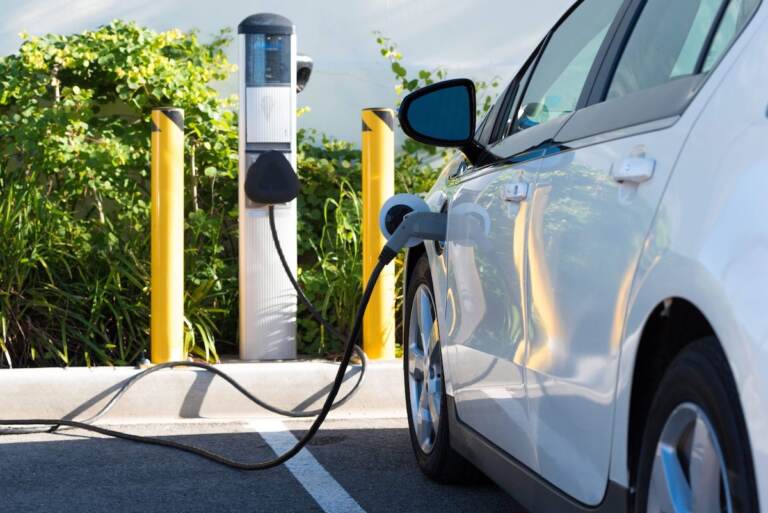
An electric car gets a charge. (Courtesy of State of Delaware)
If Delaware environmental regulators have their way, when residents go to a new car dealership in 2035, they will only find electric cars, SUVs, and light trucks from that model year.
That 100% requirement would be the last step of annual increases that could start in 2026 — three years from now — when 35% of the new cars must be electric.
That’s the regulation proposed last year by the state Department of Natural Resources and Environmental Resources. The agency has held a handful of public workshops on the issue and has scheduled a virtual public hearing for April 26. Comments from the public will be accepted through May 26, and can be made through this link.
DNREC Secretary Shawn Garvin, who was appointed by Democratic Gov. John Carney to the post in 2017, is expected to rule by early summer on whether Delaware will use the Advanced Clean Car II standard first adopted by California in 2022.
Delaware would be the 15th state to adopt the standard. Among Delaware’s neighbors, Maryland and New Jersey have adopted the rule, but Pennsylvania has not.
The percentage requirement grows from 35% in 2026 to 51% in 2028, 76% in 2031, and 88% in 2033 before hitting 100% in 2035.
Garvin stressed during a recent hearing, however, that gas-powered vehicles are not being banned, and that even in 2035, residents can still buy used ones or new cars and light trucks from previous model years.
The issue has proved to be a divisive one, with organized campaigns on both sides. Many of the hundreds of people who have commented are submitting form letters that are identical except for their name.
Here’s an excerpt from a form letter with the subject line “please issue strong clear car rules” from Patricia Williams.
“I support adopting these standards to strengthen the state’s tailpipe emission standards and phase out all internal combustion engine vehicle sales by 2035,” Williams wrote. “I am counting on you to protect Delawareans’ health and our climate by leading the transition to an all-electric future.’’
Countering those letters are ones like this from Donna Marshall.
“I am STRONGLY opposed to your extremely short-sighted plan to eliminate gas-powered vehicles,’’ Marshall wrote. “It’s mind-boggling that educated people either don’t see or don’t care how damaging this would be to our economy, not to mention the fact that our electric grid wouldn’t be able to handle that many EVs without astronomically expensive and unnecessary upgrades. Also, guess where electricity comes from. HINT: Not the plug in the wall.”
‘They want you to give up your liberties’
While Garvin ponders his decision, state Republican leaders who are against the proposal have taken the issue to the public. During five public town halls up and down the state in March, lawmakers and residents mostly spoke out in opposition.
Attendees at the sessions voiced an array of complaints about the proposals. Some criticized the science and policies surrounding the effort to reduce greenhouse gas emissions. Others decried the cost and impracticality of electric vehicles that need to be charged every few hundred miles and have expensive batteries that will eventually need replacement. Some simply love their gas-powered vehicles.
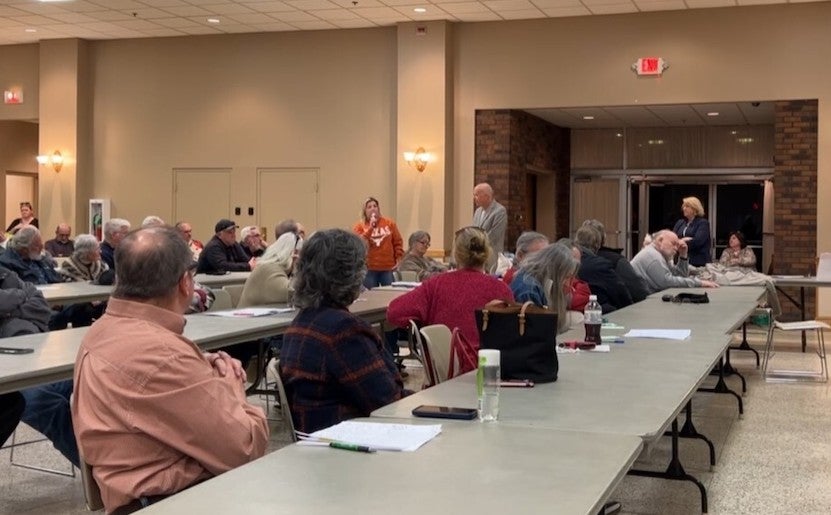
Others are adamant that the government — especially an unelected bureaucrat such as Garvin — should have no right to tell them what kind of vehicle they can or can’t buy.
“It’s a war without guns,’’ Sussex County state Rep. Rich Collins told the crowd at one session, leading an audience member to declare that “they want you to give up your liberties.”
Collins doubled down on that sentiment.
“Do you really want to drive from here to Florida, have to charge up 15 to 20 times, wait for 45 minutes each time?’’ Collins remarked. “They’re trying to take away our ability to travel.”
One woman who did not identify herself said of Garvin that “nobody voted this guy in’’ and suggested “he has a God complex” for trying to force the regulation on residents over their objections.
Delaware agencies such as DNREC have the authority to create regulations to enforce laws such as this one, which comes under the federal Clean Air Act.
Michelle Peters of Milford said residents need to band together to persuade Garvin and his boss Carney to pull the proposal, and if they lose that fight, to then take it to court.
“Our goal is to discourage the governor from mandating a product Delawareans have to buy,’’ Peters said. “The strategy has to be to arouse the public against the mandate.”
Bruce Smith of Millsboro told the audience he owns a Tesla electric vehicle and offered anyone a ride, but opposes the proposal. “I am here because I am sick and tired of mandates,” Smith said.
In an interview, Republican state Sen. Dave Lawson of Harrington in Kent County, said the mandate is pure political overreach.
“The thing that galls me about this whole thing is that it’s being shoved down our throats. You will do this,’’ Lawson said, “Wait a minute. We’re a country of choice. We have freedoms. If you don’t want one, you shouldn’t be forced into it. And I think that’s that’s the whole thing. It’s really sticking in people’s craw.”
‘This gets us to keep up with where the market is heading’
Gov. Carney’s office referred requests for comment to DNREC.
Garvin appeared at some of the GOP town halls, including one last week at the Mill Creek Fire Company near Elsmere. Even though the agency he runs has proposed the regulation, Garvin stressed that no final decision has been made.
“The process that we’re undertaking right now is evaluating,’’ Garvin told the audience. “No decision has been made by the state on the program. We’re in the process of evaluating it.”
Garvin told attendees that electric car makers are not currently sending vehicles to Delaware dealers, but would start doing so if the state adopts the California standard.
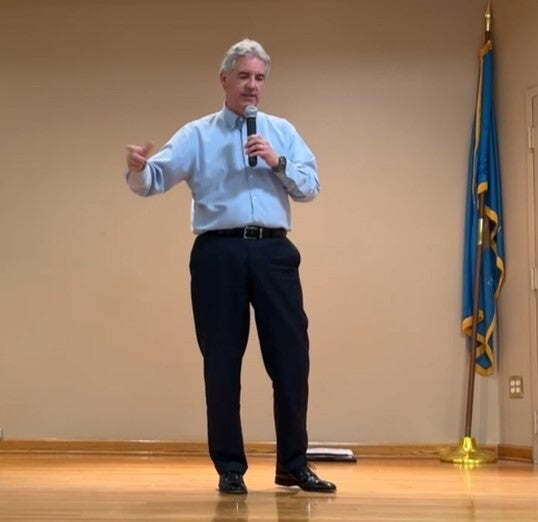
He also noted that many manufacturers, including General Motors, have said they would only be making electric cars by 2035, so Delaware would just be following the market.
“So the problem right now in Delaware is the manufacturers have a requirement to provide a certain amount of vehicles to states that have adopted this program,” Garvin said. “We have not adopted the program, so there’s no incentive for them to make those cars available to dealers in the state of Delaware.”
Garvin said the mandate, if adopted, would “ramp up” over a decade to give Delaware time to prepare, and that the state has at least $15 million to spend on charging stations and other aspects of the “electric transportation infrastructure.”
The purpose is to “make sure that the infrastructure is in place in the state as the cars are becoming available for us to be able to manage and maintain that,’’ he said.
The gradual integration of electric cars into the Delaware market also “allows our dealerships, allows our mechanics, allows others who migrate into the new market that is coming. If we wait until the car companies say, guess what, electric vehicles is all you can get, we are going to be so far behind the curve. This gets us to keep up with where the market is heading.”

Get daily updates from WHYY News!
WHYY is your source for fact-based, in-depth journalism and information. As a nonprofit organization, we rely on financial support from readers like you. Please give today.




